Reinforce compliance
and risk management
The JCU Group recognizes the importance of its corporate social responsibilities, and in order to fulfill our responsibilities, has established the "JCU Code of Conduct" as a code of compliance and ethics.
We also identify risks that could have a significant impact on the achievement of our corporate goals and business activities, and implement measures to reduce these risks.
Promoting Compliance
Based on the JCU Code of Conduct, the JCU Group always complies with relevant laws and internal rules in all aspects of our corporate activities, and promotes compliance so that all of our corporate activities comply with normal business practices and social ethics.
This Code of Conduct has been translated into seven languages other than Japanese: Chinese (Traditional and Simplified), Korean, English, Vietnamese, Thai, Spanish, and Indonesian. The Code of Conduct translated into each language is communicated to respective local subsidiaries in light of local customs and laws.
Furthermore, our Corporate Philosophy, CSR Policy, JCU Spirit, and Code of Conduct are distributed to all employees of the JCU Group to ensure that they are all well-informed.
Compliance Promotion System
The JCU Group has a Compliance Committee (chaired by the chairman and CEO) under the Board of Directors where top management take their own initiative in driving compliance forward.
The Compliance Committee is made up of internal directors and a number of Executive Officers. A meeting of compliance management leaders appointed by individual departments is installed under this Committee. Compliance management leaders make every effort to gather information on legislative revisions and gain an understanding of issues through subcommittees and other organizations for each of the different areas of laws and regulations. The Compliance Management Leaders Meeting discusses the sharing of practical information within the company and matters that should be reported to the Committee, and the content of these discussions are promptly reported to the Committee. The Committee reviews the report from a management perspective, decides what actions to take as a company, and has the relevant departments execute on these decisions.
Compliance promotion system
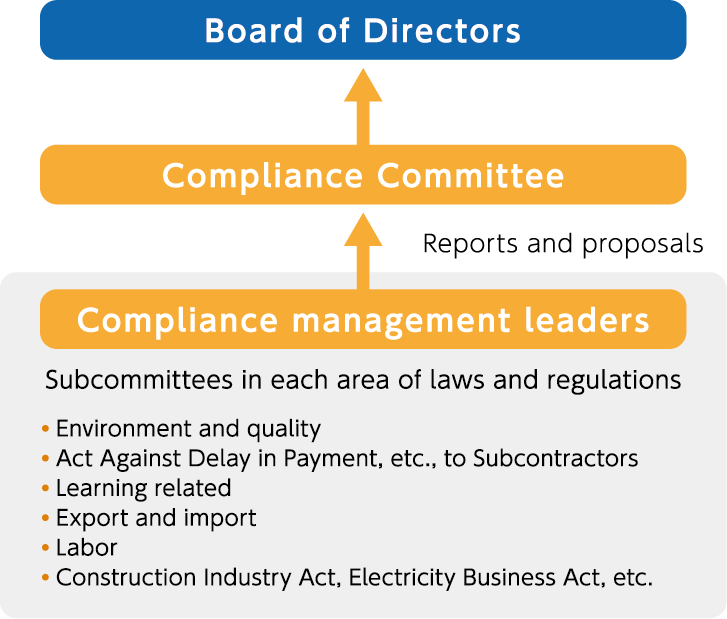
Installed the Internal and External Reporting Desk
For the purpose of detecting and correcting misconduct at an early stage, and to help strengthen our compliance, the JCU Group has a desk for internal and external reporting, and a system for properly acting on reports given by JCU Group executives and employees, as well as business partners, etc., on legal and regulatory violations committed by organizations or individuals.
Internal and external reporting desk
Nagamatsu & Yokoyama Law Office
Person in charge: Toshihide Yokoyama, attorney-at-law
- Room 806, 8th Floor, Kioicho Building, 3-12 Kioicho, Chiyoda-ku, Tokyo 102-0094, Japan
FAX:03-6910-0746Email:jcu.hotline@n-lo.com
Compliance Initiatives
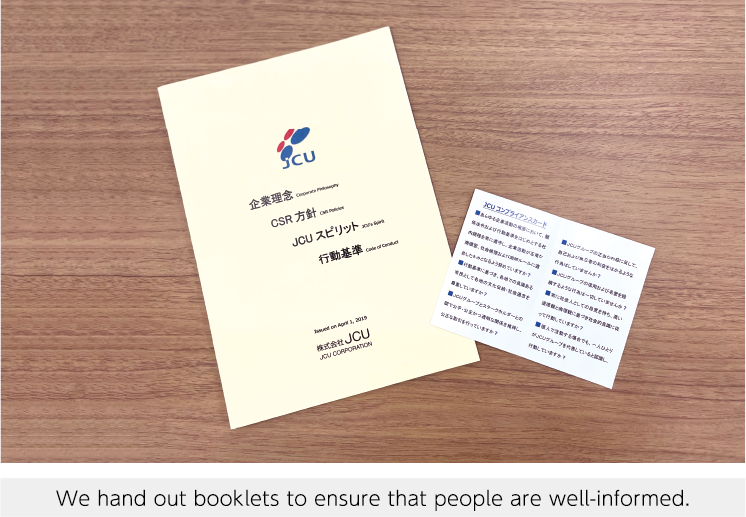
The JCU Group has established rules and guidelines, and prepares and distributes manuals in order to ensure that everyone is well-informed on the Basic Code of Conduct which represents our basic approach to compliance. We also provide learning opportunities on our e-learning system where learners participate on an individual basis. In addition, we conduct internal audits of the Group to detect problems at an early stage. In terms of activities to promote compliance, we are looking into providing training on applicable laws and regulations at each office.
The R&D Center and Niigata Plant hold study sessions on laws and regulations related to their work and on chemicals that require careful handling. We also check their levels of understanding and evaluate capabilities as part of our efforts to ensure compliance.
Installed the Compliance Consultation Desk
Apart from the internal and external reporting desk, the JCU Group also has a compliance consultation desk that makes it easier for persons to seek consultation on compliance-related questions that they may have about the company. Information on the compliance consultation desk is provided in the Compliance Manual posted on the intranet to ensure that everyone is well-informed.
Initiatives to Eliminate Antisocial Groups
The JCU Group has set out the elimination of antisocial groups in its Code of Conduct. We have no relationships with antisocial forces or organizations that pose a threat to social order or sound corporate activities, and make every effort to eliminate such groups in cooperation with competent authorities and relevant organizations.
Legal Department’s Activities to Promote Compliance
Legal Department’s Activities to Promote Compliance
At JCU, we recognize the importance of our corporate social responsibility and aim to create a workplace where employees are able to conduct themselves appropriately. In this section, we spoke with Mr. Shirakawa from the Legal Department about compliance promotion activities.
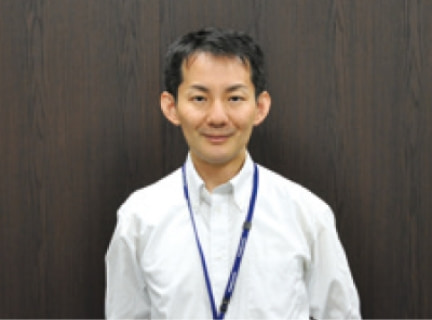
Legal Section,
Legal DepartmentYoshiaki Shirakawa
In promoting compliance, JCU strives to identify problems as early as possible and raise the awareness of each and every employee. In this context, the Legal Department regularly gives a "Compliance Quiz" for all employees as part of its activities to promote compliance. The program has been conducted in the past in a format where each student would study at their own desks, but we have significantly renewed this format in October 2022. Training materials are revised in accordance with our Code of Conduct and regulations, made easy to read in a cartoon style, and the quizzes are given every two weeks.
To ensure that no compliance violations occur in any area of our operations, the program is for all employees; not only full-time employees, but also employees on loan overseas and temporary staff. Initially, there were some people who did not take the quiz, but this has now spread to a point where we have a response rate of over 95%. The quizzes cover a comprehensive range of topics, and this has helped raise the baseline level of knowledge of laws and regulations, and improve awareness throughout the company.
Law is a highly specialized field, and at first glance, people may feel that it doesn’t have much to do with them, but the Legal Department believes that by making people aware of how closely it relates to them and helping them to overcome this sense that it is too difficult, all employees can become aware that they are actually in the driver’s seat when it comes to legal compliance. We will continue our activities to promote compliance and strive to make the Legal Department an "easy-to-consult" place where people are welcome to come in with questions on legal topics.
Risk Management Structure
The JCU Group has a Risk Management Committee chaired by the chairman and CEO under the Board of Directors. The Committee is made up of internal directors and a number of Executive Officers. A meeting of risk management leaders appointed by individual departments is installed under this Committee. The Risk Management Leaders Meeting examines the details of risks identified for each department, and carries out frequent and long-hour discussions based on perspectives such as risk levels and current countermeasures. The content of these discussions is promptly reported to the Management Committee which reviews the report from a management perspective to identify the risks that are ultimately key for the JCU Group, and determines the countermeasures to be taken at individual departments.
Risk management schematic
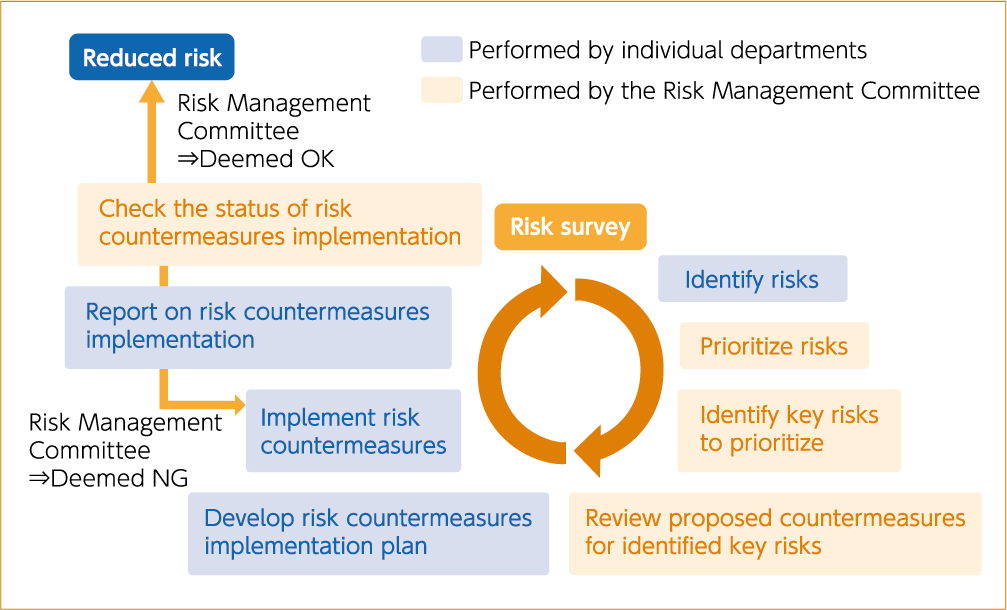
Risk management structure
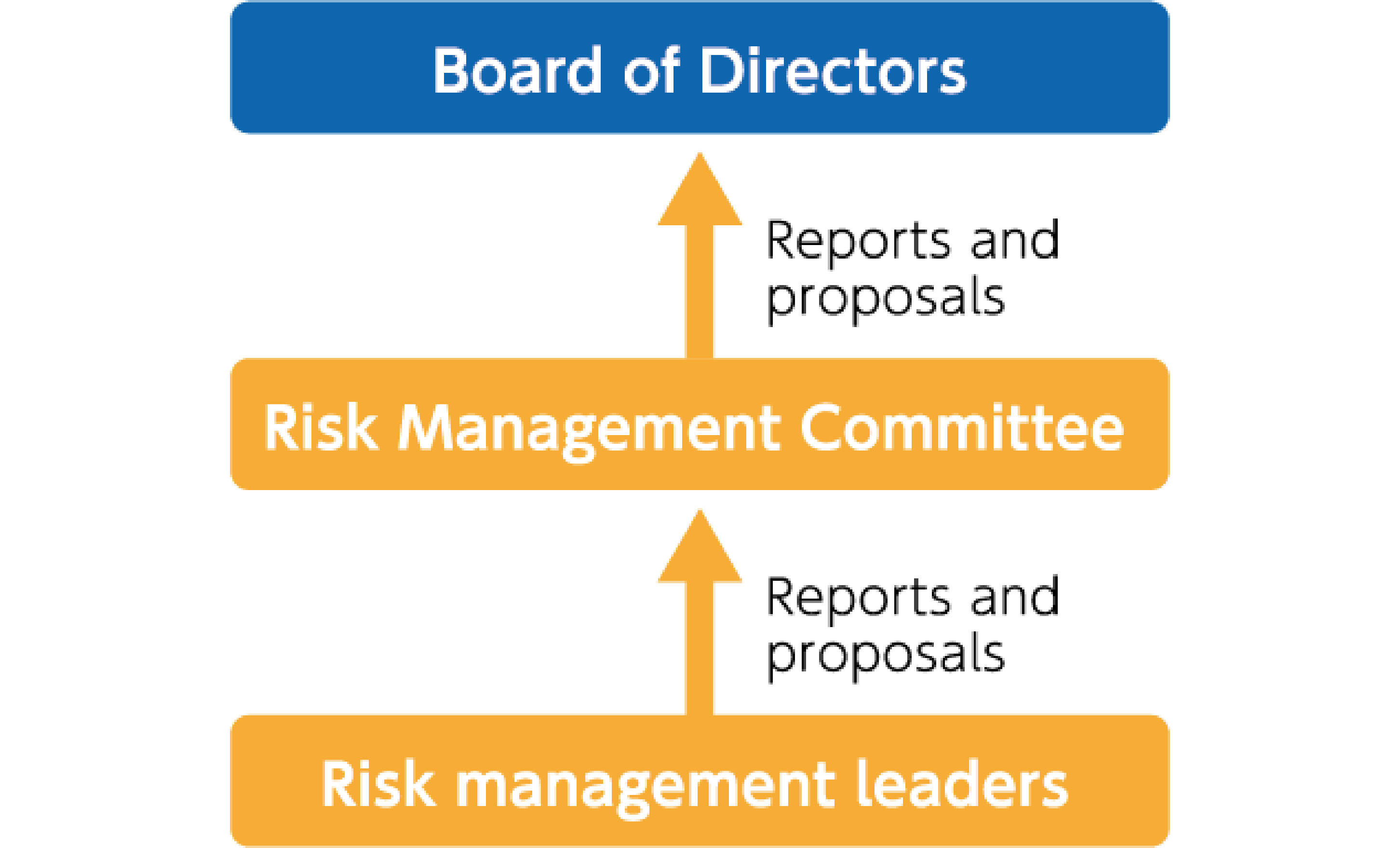
Key Risk
The Risk Management Committee has identified the following risks as being the 21 key risks for our Company: management (of risk, of distribution) We will make every effort to continue to strengthen our risk management.
Risk Management Committee
- Developments in demand side industries (automotive, electronics)
- Legal regulations
- Competition with other companies, delays in new technologies development
- Material price fluctuations
- Securing and developing HR
- Fixed asset impairment accounting
- Information system failure
- Exchange rate fluctuations
- Occupational safety and health
- Tax and transfer price taxation
- Products and services
- Overseas operations
- Harassment
- Irrecoverable receivables, etc.
- Intellectual property protection and infringement
- Technical know-how leak
- Price fluctuations in held securities
- Natural disasters, accidents, communicable diseases, etc.
- Quality control system
- Risks related to management policies and strategies
- Environmental Conservation
Driving Forward Business Continuity Management (BCM)
o prepare for unforeseen events, the JCU Group has a Business Continuity Plan (BCP) in place so that we are able to continue our operations and minimize the impact on our customers even in the event of an emergency. We hold briefing sessions on our business continuity plan and distribute booklets explaining the outline of our BCP to raise awareness among employees at all business sites.
The major emergencies that our BCP prepares for include intense earthquakes, storms, floods, fires, IT failures, and supply chain disruptions.
Our Niigata Plant was damaged in the earthquake that hit Noto Peninsula on January 1, 2024, but thanks to our swift and appropriate response, we did not experience any personal casualties and were able to successfully restore and resume operations on our normal start of business day. Additionally, as part of our BCP efforts, we are currently building our second domestic production factory in Kumamoto Prefecture.
In addition, at domestic and overseas business locations, we pay close attention to the situation in each country and region, and continue to take various measures, such as preparing first aid kits, setting up emergency contact networks, and reviewing response manuals.
Employee safety and business continuation will continue to be the top priorities in all responses that we take at the JCU Group.
Conducting Drills
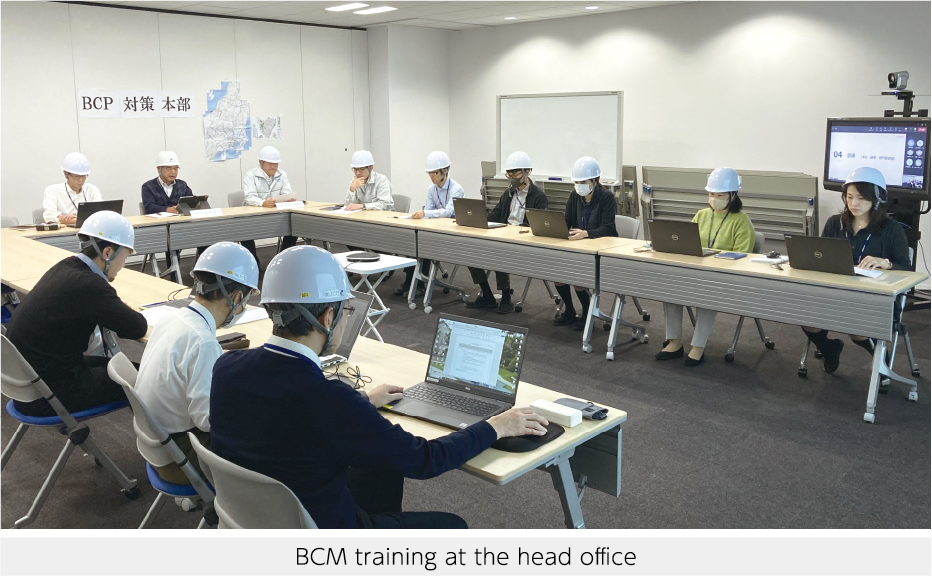
At JCU, we systematically carry out BCM drills to raise awareness among executives and employees, and to clarify their roles in the event of an emergency.
In the FY ending March 2024, we conducted a drill on setting up an emergency response headquarters at our head office. Based on a scenario that a major earthquake had struck, a simulation was conducted where each department would announce the activation of their BCP, confirm the safety of employees and the extent of the damage, and report to the head of the BCP countermeasures headquarters. Through this drill, the participants confirmed how each person should act and what obstacles they might encounter in the event of an emergency.
In the event of an emergency, we set up emergency response headquarters at affected offices, and a BCP response headquarters at the head office. If this is difficult to set up at the head office, it is to be set up at an alternative office in accordance with the manual.
Introduced a Safety Confirmation System
As part of our BCP, JCU has a safety confirmation system in place that enables us to easily and quickly confirm the safety status of our employees during large-scale disasters, or nation wide/global epidemics/pandemics of communicable diseases. Multiple times a year, we conduct safety confirmation drills on an irregular basis using this system to prepare for emergencies.




